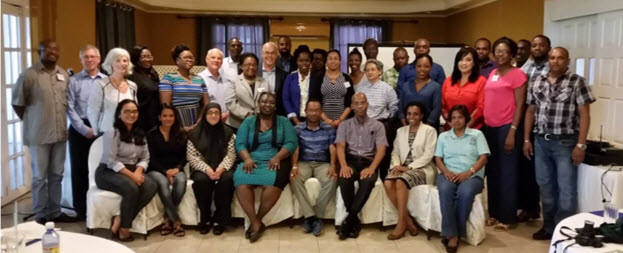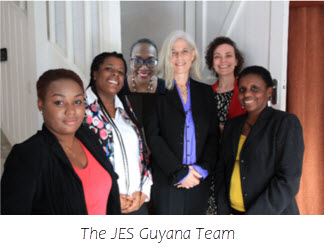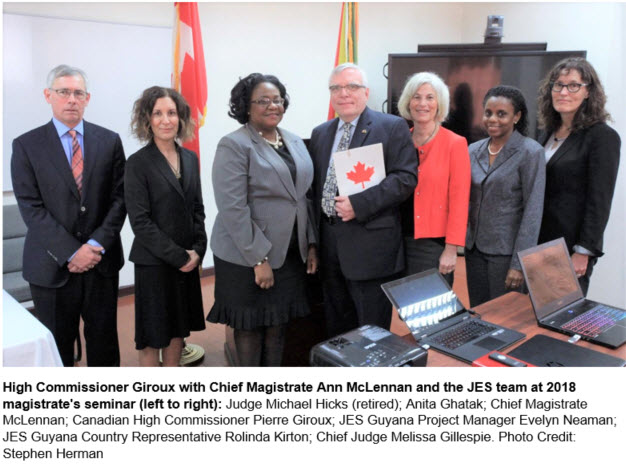This month, BC’s Justice Education Society wraps up a five and a half year project to strengthen the criminal justice system in Guyana, South America’s only English-speaking country. BC Provincial Court judges, volunteering their time and expertise, made important contributions to the project in this small country bordered by Venezuela, Suriname, and Brazil.
Before the project began, Guyana had experienced a sharp increase in violent crime. In 2014 police reported 27% more gun crimes than in the previous year, and murders and armed robberies were also on the rise. Violence within families had increased as well – in 2014 there were 4000 domestic violence reports in a population of 800,000. And drug smuggling was rampant, with organised gangs trafficking cocaine from Peru, Colombia, and Bolivia to Africa, Europe, and North America through Guyana.
Guyanese judges, magistrates, prosecutors, and police were struggling to deal effectively with these problems with severely limited resources. In 2015 the Canadian High Commission and the US embassy in Guyana commissioned the Justice Education Society (JES) to assess the country’s criminal justice system and identify areas where it could support Guyanese efforts to reduce crime. Provincial Court Judge Michael Hicks accompanied JES Executive Director Rick Craig to Guyana to learn firsthand the priorities of those working in the justice system.

Magistrates Court, Georgetown, Guyana - Photo Credit: Stephen Herman
Among their findings were a variety of problems with criminal investigations. Just one example - hand-written, warned confessions were the primary method of evidence-gathering in Guyana. But these statements, sometimes taken from illiterate suspects, weren’t recorded or transcribed, and many police officers took few notes. (During the ensuing project JES was able to provide forensic video analysis equipment and increase the use of video evidence with system-wide training on its use.)
Court backlogs were a serious problem in Guyana, where a high number of cases were set for trial. Trials were not recorded – Guyanese magistrates and judges had to create a record by writing out witnesses’ testimony word for word and reading it back for confirmation. Not surprisingly, trials moved very slowly.
In October 2016, the BC Provincial Court hosted Guyanese judicial officers on a study tour featuring discussion of backlog and case management issues in adult and youth criminal matters. The delegation visited our bail courts, drug treatment court, and courtrooms equipped with digital audio-recording equipment and video links with correctional centres (both then lacking in Guyanese Magistrates’ Court).

Presenters from Canada and participants from across the justice sector at the Trial Management Seminar in December 2016 - Photo Credit: Stephen Herman
The Court’s involvement was just one facet of a three-part project. During the first two stages, JES offered over 90 seminars and training sessions, reaching more than 1700 Guyanese crime scene technicians, investigators, prosecutors, magistrates, High Court judges, and members of the media, some of whom in turn educated their colleagues. Presenters included Judge Hicks, Justice Thomas Crabtree (BC Provincial Court Chief Judge until May 2018), Chief Judge Melissa Gillespie (Associate Chief Judge until May 2018), experienced prosecutors and police officers, and BC media experts. JES also provided on-going coaching, monitoring and evaluation.
Justice Crabtree worked with the Guyanese Chancellor (the head of the judiciary in Guyana) to report on the backlog in Magistrates Court. He also advised Guyanese colleagues on formation of the Judicial Education Institute, initiatives to support magistrates in prioritizing their educational needs, and court communications strategies. In 2020 Justice Crabtree participated as part of a delegation in a “listening tour” visiting Indigenous communities across Guyana to learn about their justice needs.

His successor Chief Judge Melissa Gillespie participated in diagnostic activities and meetings with police, prosecutors, defence lawyers, magistrates, and judges. She spoke at judicial education seminars on forensic evidence, video-recorded interviews, hearsay, and vulnerable witnesses. Chief Judge Gillespie also advised on scheduling, trial management, and the introduction of a First Instance Court in Georgetown.
In addition to individual judges’ ongoing involvement and the 2016 study tour, the Provincial Court welcomed three Guyanese magistrates at its Criminal Law Boot Camp and semi-annual education conference in 2018. The magistrates also met with Judge Rita Bowry, chair of the Court’s Education Committee, to learn about the pedagogical approach used in BC Provincial Court education conferences.
The Provincial Court’s involvement in the JES project has been fruitful. Due to the leadership of the current and former Guyanese Chancellors, the Chief Magistrate, their judicial colleagues, and their teams and the openness and hard work of those in the Guyanese justice system, the country has implemented many impressive judicial reforms.
For example, since the 2016 visit to Vancouver, the Guyana Magistrates’ Court has:
• opened a first appearance/bail court that ensures cases are ready to go to trial, reducing adjournments and wasted trial time
• opened specialized drug treatment and children’s courts (Watch a video on the Guyanese Drug Court.)
• had audio-recording equipment installed in some Guyanese courts
• had video links created between more than a 24 prisons and remote courthouses in areas with Indigenous populations to address access to justice issues
Most recently, JES worked with Guyanese judges to support their communications and outreach work and build public confidence in the administration of justice. Justice Crabtree (now a Supreme Court of BC justice), Chief Judge Gillespie, and Judge Ann Rounthwaite (retired), as well as Alberta Court of Queen’s Bench Chief Justice Mary Moreau and Communications Officer Tony Blais, participated in virtual discussions and seminars with Guyanese judges and magistrates, leading to development of three weekend media training webinars presented by the Guyanese courts and attended by more than 140 media personnel and members of civil society organizations.
During the project, the Guyanese Supreme Court also launched a website and Facebook page with links to 16 court information presentations from magistrates, judges, and media professionals.
Reflecting on JES’ work in Guyana, Chief Judge Gillespie observed,
One of the things that JES was able to do very effectively in Guyana was to bring together groups of stakeholders who were involved in the justice system but lacked the strong communication networks we enjoy in BC. I think this inspired collaboration and understanding amongst the various stakeholders.
In many respects the journey of the judiciary in Guyana is not much different from that of other courts around the world now – attempting to improve effectiveness and efficiency and modernize some of our processes. One aspect of our work in Guyana was to assist them to harness technology to improve access to justice, to improve the quality of evidence, and to help everyone involved in the justice system come together to understand the impacts of using technology. That isn’t something unique to Guyana, but something happening around the world right now.”
Judge Hicks (now retired) added,
“I did not go to Guyana with any preconceived notions about the extent of the challenges they faced. The background reports suggested a variety of issues which were not unfamiliar based on my experience over 30 years in BC.
What I discovered were Guyanese colleagues with a determination to do the very best job possible with extremely limited resources - resources which are a small fraction of those available here. Every sector from police investigation to prosecution to legal aid to judiciary to probation/corrections faces remarkable resource challenges.
The enthusiastic welcome we received from our Guyanese colleagues, and their strong commitment to assess our ideas and debate their pros and cons for Guyana has made the experience particularly rewarding for me. … I urge everyone who receives a call from JES to participate in one of their projects here or abroad to jump at the opportunity. You will not regret it.”
For more information on JES’ work in Guyana, see Where we help Guyana.


